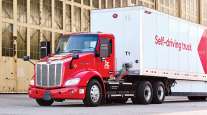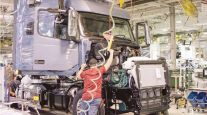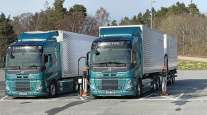Senior Reporter
Volvo Group, Nvidia to Co-Develop Autonomous Vehicles

[Stay on top of transportation news: Get TTNews in your inbox.]
The Volvo Group announced it has expanded its relationship with Nvidia Corp. and the two companies will co-develop the decision-making system for Volvo’s autonomous commercial vehicles intended eventually for use on public roads and transportation facilities, among other applications.
Nvidia said the partnership was nonexclusive, but is an important first.
.@VolvoGroup has selected NVIDIA DRIVE to transform the trucking industry, using #AI to revolutionize how people and products move all over the world: https://t.co/M6oyO3oMAv #autonomousvehicles pic.twitter.com/tp4y8j1MVY
— NVIDIA DRIVE (@nvidiadrive) June 18, 2019
“What’s unique about today’s announcement with Volvo Group is that this is the first end-to-end platform design win for autonomous trucks — spanning training, simulation and in-vehicle AI computers to deliver a system that can safely handle complex scenarios, including fully autonomous driving on public roads and highways. With this specific partnership, Volvo Group is also leveraging our full Drive AV software stack, which includes perception, localization and path planning,” Danny Shapiro, senior director of automotive at Nvidia, told Transport Topics.
He added Drive is an open platform, and “hundreds of companies around the world are utilizing our platform, including virtually every automaker, truck maker, mapping company, Tier 1 supplier and startup that are building autonomous vehicles.”
The agreement will span several years, according to the Gothenburg, Sweden-based truck maker. Work will begin immediately with personnel from the two companies being co-located in Gothenburg and Santa Clara, Calif. — Nvidia has co-located with other partners, too, in the U.S., Germany, Japan and China.
“Nvidia has a huge exposure to other automated driving developers, car and truck, and that brings a lot of value in itself,” said Richard Bishop, principal of Bishop Consulting. “It is valuable and important to partner with others in the automated driving ecosystem. It is not necessarily important that that be a chipmaker.”
For example, Daimler Trucks in March agreed to acquire a majority stake in autonomous vehicle pioneer Torc Robotics. Together, they will develop highly automated trucks to serve the U.S. freight market.
“Partnership is the new leadership,” Volvo Group CEO Martin Lundstedt said during Volvo’s Capital Day Markets event June 18. “In this world of unknowns, you need a partnership built on trust. We continue to gradually introduce automated applications in the entire spectrum of automation, from driver support systems to fully autonomous vehicles and machines. This partnership with Nvidia is an important next step on that journey.”
Listen to what Martin Lundstedt, President and CEO of the @VolvoGroup, and Jensen Huang, @nvidia founder and CEO, have to say about the new partnership. pic.twitter.com/KzWefxiWW1 — Volvo Group (@VolvoGroup) June 18, 2019
Volvo will use Nvidia’s autonomous driving platform, Drive, to train, test and deploy self-driving AI vehicles — targeting freight transport, public transport, refuse and recycling collection, and the construction, mining and forestry industries.
“Everything that we are going to do has never been done before — the way the software is developed, the algorithms of this new approach, the type of computers we will use to run the software are all completely revolutionary,” Nvidia CEO Jensen Huang said. “Artificial intelligence is the most powerful technology force the industry has ever known.”

In our third episode of RoadSigns, we ask: How does AI change trucking's back office? Hear a snippet from host Seth Clevenger, above, and get the full program by going to RoadSigns.TTNews.com.
Autonomous trucks, operating 24 hours a day, can improve delivery times and increase efficiency, according to Nvidia.
The consulting firm McKinsey & Co. has forecast autonomous trucks could bring down the annual cost of logistics in the U.S. by 45% — or between $85 billion and $125 billion.
Another commercial vehicle consultant agreed autonomous freight-hauling trucks are coming, but probably not in the way the general media portrays it, as a truck delivering goods without a driver.
Instead, truck drivers will manage situations, like airline pilots do, while automated systems generally operate the truck, said Chris Brady, principal at Commercial Motor Vehicle Consulting. “Truck drivers may alter the route due to detours or storms or other unforeseen events. I believe a driver is the best one to make these decisions. Truck drivers may be needed for certain driving situations, as well, where humans can also analyze the total picture better than machines.”




